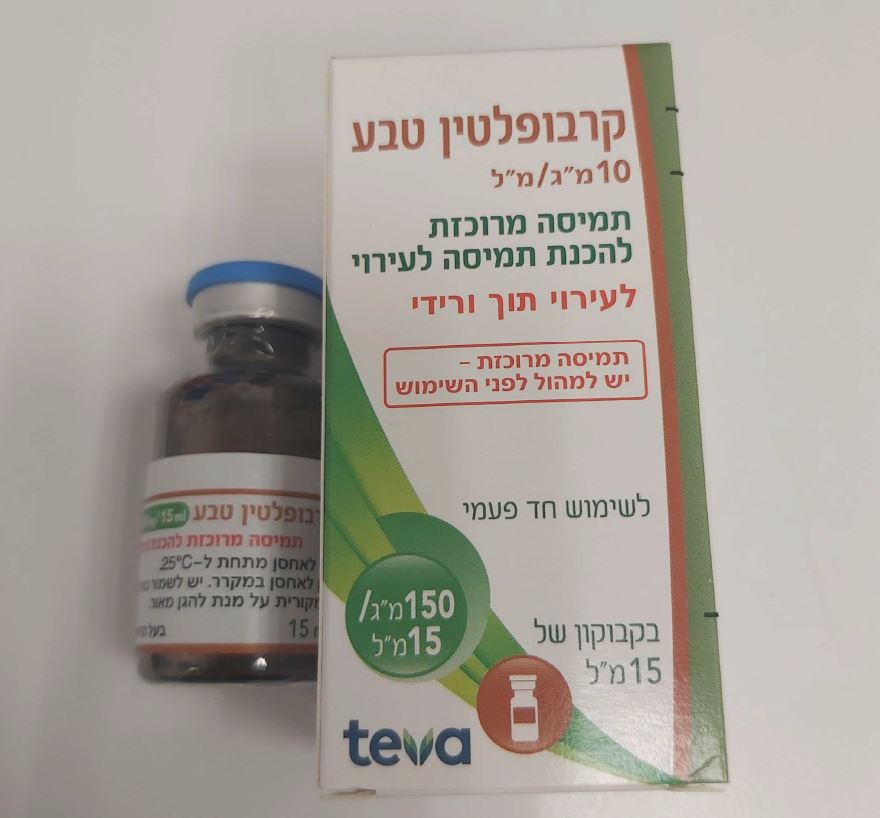Quest for the right Drug

קרבופלטין טבע CARBOPLATIN TEVA (CARBOPLATIN)
תרופה במרשם
תרופה בסל
נרקוטיקה
ציטוטוקסיקה
צורת מתן:
תוך-ורידי : I.V
צורת מינון:
תרכיז להכנת תמיסה לאינפוזיה : CONCENTRATE FOR SOLUTION FOR INFUSION
עלון לרופא
מינוניםPosology התוויות
Indications תופעות לוואי
Adverse reactions התוויות נגד
Contraindications אינטראקציות
Interactions מינון יתר
Overdose הריון/הנקה
Pregnancy & Lactation אוכלוסיות מיוחדות
Special populations תכונות פרמקולוגיות
Pharmacological properties מידע רוקחי
Pharmaceutical particulars אזהרת שימוש
Special Warning עלון לרופא
Physicians Leaflet
Special populations : אוכלוסיות מיוחדות
Geriatric use In studies involving combination therapy with carboplatin and cyclophosphamide, elderly patients treated with carboplatin were more likely to develop severe thrombocytopenia than younger patients. Because renal function is often decreased in the elderly, renal function should be considered when determining dosage (see section 4.2). Reversible Posterior Leukoencephalopathy Syndrome (RPLS) Cases of Reversible Posterior Leukoencephalopathy Syndrome (RPLS) have been reported in patients receiving carboplatin in combination chemotherapy. RPLS is a rare, reversible after treatment discontinuation, rapidly evolving neurological condition, which can include seizure, hypertension, headache, confusion, blindness, and other visual and neurological disturbances (see section 4.8). Diagnosis of RPLS is based upon confirmation by brain imaging, preferably MRI (Magnetic Resonance Imaging). Venoocclusive liver disease Cases of hepatic venoocclusive disease (sinusoidal obstruction syndrome) have been reported, some of which were fatal. Patients should be monitored for signs and symptoms of abnormal liver function or portal hypertension which do not obviously result from liver metastases. Tumour lysis syndrome (TLS) In post-marketing experience tumour lysis syndrome (TLS) has been reported in patients following the use of carboplatin alone or in combination with other chemotherapeutic agents. Patients at high risk of TLS, such as patients with high proliferative rate, high tumour burden, and high sensitivity to cytotoxic agents, should be monitored closely and appropriate precaution taken. Other Auditory defects have been reported during carboplatin therapy. Ototoxicity may be more pronounced in children. Cases of hearing loss with a delayed onset have been reported in paediatric patients. A long-term audiometric follow-up in this population is recommended. Carboplatin Teva EM 12/2023 Notification Administration of live or live-attenuated vaccines in patients immunocompromised by chemotherapeutic agents, including carboplatin, may result in serious or fatal infections. Vaccination with a live vaccine should be avoided in patients receiving carboplatin. Killed or inactivated vaccines may be administered; however, the response to such vaccines may be diminished. Men and women should use effective methods of contraception (see section 4.6). Paediatric population Safety and efficacy of carboplatin in paediatric patients have not been established. 4.5 Interaction with other medicinal products and other forms of interaction Due to the increase of thrombotic risk in case of tumoural diseases, the use of anticoagulative treatment is frequent. The high intra-individual variability of the coagulability during diseases, and the eventuality of interaction between oral anticoagulants and anticancer chemotherapy, require, if it is decided to treat the patient with oral anticoagulants, to increase frequency of the control of the INR monitoring. Concomitant use contraindicated - Yellow fever vaccine: risk of generalised vaccinal disease mortal (see section 4.3). Concomitant use not recommended - Live-attenuated vaccines (except yellow fever): Risk of systemic, possible fatal disease. This risk is increased in subjects who are already immunosuppressed by their underlying disease. Use an inactivated vaccine where this exists (poliomyelitis). - Phenytoin, fosphenytoin: Risk of exacerbation of convulsions resulting from the decrease of phenytoin digestive absorption by the cytotoxic drug or risk of toxicity enhancement or lose of efficacy of the cytotoxic drug due to increased hepatic metabolism by phenytoin. - Complex-forming compounds: Concomitant administration of carboplatin and complex-forming compounds should be avoided, as theoretically, the antineoplastic effects of carboplatin might be decreased. However, in animals and clinically, the antineoplastic effects of carboplatin were not influenced by diethylthiocarbamate. Concomitant use to take into consideration - Cyclosporin (and by extrapolation tacrolimus and sirolimus): Excessive immunosuppression with risk of lymphoproliferation. - Nephrotoxic and/or ototoxic drugs: The concomitant use of carboplatin with nephrotoxic and/or ototoxic drugs (e.g., aminoglycoside antibiotics, loop diuretics) should be taken into account due to the cumulative nephrotoxicity and ear toxicity, particularly in renal failure patients. - Myelosuppressive compounds: Myelosuppression is worsened by therapy combining carboplatin with other compounds that are myelosuppressive. 4.6 Fertility, pregnancy and lactation Fertility Gonadal suppression resulting in amenorrhea or azospermia may occur in patients receiving antineoplastic therapy. These effects appear to be related to dose and length of therapy and may be irreversible. Prediction of the degree of testicular or ovarian function impairment is complicated by the common use of combinations of several antineoplastics, which makes it difficult to assess the effects of individual agents. Men of sexually mature age treated with carboplatin are recommended not to father a child during treatment and up to 6 months afterwards and to ask advice about spermatic preservation prior to initiation of the therapy because of the possibility of irreversible infertility due to therapy with carboplatin. Carboplatin Teva EM 12/2023 Notification Pregnancy Carboplatin can cause foetal harm when administered to a pregnant woman. Carboplatin has been shown to be embryotoxic and teratogenic in rats receiving the drug during organogenesis. No controlled studies in pregnant women have been conducted. If this drug is used during pregnancy, or if the patient becomes pregnant while taking this drug, the patient should be apprised of the potential hazard to the foetus. Women with child-bearing potential should be advised to avoid becoming pregnant. All patients of reproductive age should be advised to use an effective contraceptive method for themselves and/or their sexual partners during therapy and for at least six months after therapy. For women who are pregnant or become pregnant during therapy, genetic counselling should be provided. Breast-feeding It is not known whether carboplatin is excreted in human milk. Because there is a possibility of toxicity in nursing infants secondary to carboplatin treatment of the mother, breast-feeding must be discontinued if the mother is treated with carboplatin.

שימוש לפי פנקס קופ''ח כללית 1994
לא צוין
תאריך הכללה מקורי בסל
01/01/1995
הגבלות
תרופה מוגבלת לשימוש בבתי חולים או אשפוז יום
מידע נוסף
